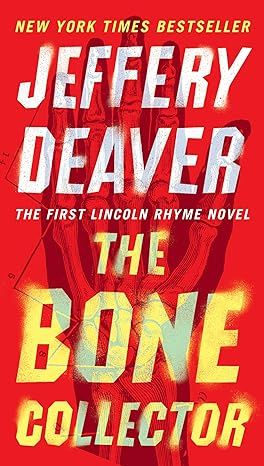The Bone Collector (Lincoln Rhyme Novel)
4.5
-
7,183 ratings
DON'T MISS THE NBC TELEVISION SERIES LINCOLN RHYME: HUNT FOR THE BONE COLLECTOR
The first novel in the New York Times bestselling series featuring forensic detective Lincoln Rhyme—from the author of The Never Game.
“Lightning-paced…a breakneck thrill ride.”—The Wall Street Journal
Lincoln Rhyme was once a brilliant criminologist, a genius in the field of forensics—until an accident left him physically and emotionally shattered. But now a diabolical killer is challenging Rhyme to a terrifying and ingenious duel of wits. With police detective Amelia Sachs by his side, Rhyme must follow a labyrinth of clues that reaches back to a dark chapter in New York City’s past—and reach further into the darkness of the mind of a madman who won’t stop until he has stripped life down to the bone.
Includes the short story “A Perfect Plan” and a chapter from The Midnight Lock.
Kindle
$7.99
Available instantly
Audiobook
$0.00
with membership trial
Library Binding
$20.80
Paperback
$8.59
Ships from
Amazon.com
Payment
Secure transaction
ISBN-10
0451469798
ISBN-13
978-0451469793
Print length
592 pages
Language
English
Publisher
G.P. Putnam's Sons
Publication date
May 05, 2014
Dimensions
4.19 x 1.19 x 7.5 inches
Item weight
10.2 ounces
Product details
ASIN :
B000OIZUUS
File size :
3325 KB
Text-to-speech :
Enabled
Screen reader :
Supported
Enhanced typesetting :
Enabled
X-Ray :
Enabled
Word wise :
Enabled
Editorial Reviews
Praise for The Bone Collector
“Stunning...fascinating...a page-turner.”—People “The Bone Collector is so dazzling, it makes your eyes water.”—The New York Times Book Review “The headlong narrative...never lets up, and there is plenty of genuine forensic knowledge in evidence. There are dramatic switcheroos up to the very last page, and a climactic battle to the death.”—Publishers Weekly “Deaver marries forensic work that would do Patricia Cornwell proud to a turbocharged plot that puts Benzedrine to shame.”—Booklist “Craftily blends cutting-edge forensics, turn-of-the-century-Manhattan mayhem, pursuers becoming pursued.”—The Wall Street Journal
“A top-notch thriller....Rhyme is a great character...and Sachs a great partner. Chilling.”—San Francisco Chronicle
More Praise for Jeffrey Deaver
“The master of ticking-bomb suspense.”—People
“The Lincoln Rhyme series is simply outstanding.”—San Jose Mercury News “[Rhyme] is among the most brilliant and vulnerable of crime fiction’s heroes.”—New York Post “[Deaver is] the most clever plotter on the planet.”—Publishers Weekly “Deaver is the master of the plot twist, and readers will only drive themselves crazy trying to outguess him.”—Booklist
Sample
ONE
Friday, 10:30 p.m., to Saturday, 3:30 p.m.
She wanted only to sleep.
The plane had touched down two hours late and there’d been a marathon wait for the luggage. And then the car service had messed up; the limo’d left an hour ago. So now they were waiting for a cab.
She stood in the line of passengers, her lean body listing against the weight of her laptop computer. John rattled on about interest rates and new ways of restructuring the deal but all she could think was: Friday night, 10:30. I wanna pull on my sweats and hit the hay.
Gazing at the endless stream of Yellow Cabs. Something about the color and the similarity of the cars reminded her of insects. And she shivered with the creepy-crawly feeling she remembered from her childhood in the mountains when she and her brother’d find a gut-killed badger or kick over a red-ant nest and gaze at the wet mass of squirming bodies and legs.
T.J. Colfax shuffled forward as the cab pulled up and squealed to a stop.
The cabbie popped the trunk but stayed in the car. They had to load their own luggage, which ticked John off. He was used to people doing things for him. Tammie Jean didn’t care; she was still occasionally surprised to find that she had a secretary to type and file for her. She tossed her suitcase in, closed the trunk and climbed inside.
John got in after her, slammed the door and mopped his pudgy face and balding scalp as if the effort of pitching his suit-bag in the trunk had exhausted him.
“First stop East Seventy-second,” John muttered through the divider.
“Then the Upper West Side,” T.J. added. The Plexiglas between the front and back seats was badly scuffed and she could hardly see the driver.
The cab shot away from the curb and was soon cruising down the expressway toward Manhattan.
“Look,” John said, “that’s why all the crowds.”
He was pointing at a billboard welcoming delegates to the UN peace conference, which was starting on Monday. There were going to be ten thousand visitors in town. T.J. gazed up at the billboard—blacks and whites and Asians, waving and smiling. There was something wrong about the artwork, though. The proportions and the colors were off. And the faces all seemed pasty.
T.J. muttered, “Body snatchers.”
They sped along the broad expressway, which glared an uneasy yellow under the highway lights. Past the old Navy Yard, past the Brooklyn piers.
John finally stopped talking and pulled out his Texas Instruments, started crunching some numbers. T.J. sat back in the seat, looking at the steamy sidewalks and sullen faces of people sitting on the brownstone stoops overlooking the highway. They seemed half-comatose in the heat.
It was hot in the cab too and T.J. reached for the button to lower the window. She wasn’t surprised to find that it didn’t work. She reached across John. His was broken too. It was then that she noticed that the door locks were missing.
The door handles too.
Her hand slid over the door, feeling for the nub of the handle. Nothing—it was as if someone had cut it off with a hacksaw.
“What?” John asked.
“Well, the doors . . . How do we open them?”
John was looking from one to the other when the sign for the Midtown Tunnel came and went.
“Hey!” John rapped on the divider. “You missed the turn. Where’re you going?”
“Maybe he’s going to take the Queensboro,” T.J. suggested. The bridge meant a longer route but avoided the tunnel’s toll. She sat forward and tapped on the Plexiglas, using her ring.
“Are you taking the bridge?”
He ignored them.
“Hey!”
And a moment later they sped past the Queensboro turnoff.
“Shit,” John cried. “Where’re you taking us? Harlem. I’ll bet he’s taking us to Harlem.”
T.J. looked out the window. A car was moving parallel to them, passing slowly. She banged on the window hard.
“Help!” she shouted. “Please . . .”
The car’s driver glanced at her once, then again, frowning. He slowed and pulled behind them but with a hard jolt the cab skidded down an exit ramp into Queens, turned into an alley and sped through a deserted warehouse district. They must’ve been going sixty miles an hour.
“What’re you doing?”
T.J. banged on the divider. “Slow down. Where are?—”
“Oh, God, no,” John muttered. “Look.”
The driver had pulled on a ski mask.
“What do you want?” T.J. shouted.
“Money? We’ll give you money.”
Still, silence from the front of the cab.
T.J. ripped open her Targus bag and pulled out her black laptop. She reared back and slammed the corner of the computer into the window. The glass held though the sound of the bang seemed to scare the hell out of the driver. The cab swerved and nearly hit the brick wall of the building they were speeding past.
“Money! How much? I can give you a lot of money!” John sputtered, tears dripping down his fat cheeks.
T.J. rammed the window again with the laptop. The screen flew off under the force of the blow but the window remained intact.
She tried once more and the body of the computer split open and fell from her hands.
“Oh, shit . . .”
They both pitched forward violently as the cab skidded to a stop in a dingy, unlit cul-de-sac.
The driver climbed out of the cab, a small pistol in his hand.
“Please, no,” she pleaded.
He walked to the back of the cab and leaned down, peering into the greasy glass. He stood there for a long time, as she and John scooted backwards, against the opposite door, their sweating bodies pressed together.
The driver cupped his hands against the glare from the streetlights and looked at them closely.
A sudden crack resonated through the air, and T.J. flinched. John gave a short scream.
In the distance, behind the driver, the sky filled with red and blue fiery streaks. More pops and whistles. He turned and gazed up as a huge, orange spider spread over the city.
Fireworks, T.J. recalled reading in the Times. A present from the mayor and the UN secretary-general for the conference delegates, welcoming them to the greatest city on earth.
The driver turned back to the cab. With a loud snap he pulled up on the latch and slowly opened the door.
• • •
The call was anonymous. As usual.
So there was no way of checking back to see which vacant lot the RP meant. Central had radioed, “He said Thirty-seven near Eleven. That’s all.”
Reporting parties weren’t known for Triple A directions to crime scenes.
Already sweating though it was just nine in the morning, Amelia Sachs pushed through a stand of tall grass. She was walking the strip search—what the Crime Scene people called it—an S-shaped pattern. Nothing. She bent her head to the speaker/mike pinned to her navy-blue uniform blouse.
“Portable 5885. Can’t find anything, Central. You have a further-to?”
Through crisp static the dispatcher replied, “Nothing more on location, 5885. But one thing . . . the RP said he hoped the vic was dead. K.”
“Say again, Central.”
“The RP said he hoped the victim was dead. For his sake. K.”
“K.”
Hoped the vic was dead?
Sachs struggled over a wilted chain-link and searched another empty lot. Nothing.
She wanted to quit. Call in a 10-90, unfounded report, and go back to the Deuce, which was her regular beat. Her knees hurt and she was hot as stew in this lousy August weather. She wanted to slip into the Port Authority, hang with the kids and have a tall can of Arizona iced tea. Then, at 11:30—just a couple of hours away—she’d clean out her locker at Midtown South and head downtown for the training session.
But she didn’t—couldn’t—blow off the call. She kept going: along the hot sidewalk, through the gap between two abandoned tenements, through another vegetation-filled field.
Her long index finger pushed into her flattop uniform cap, through the layers of long red hair piled high on her head. She scratched compulsively then reached up underneath the cap and scratched some more. Sweat ran down her forehead and tickled and she dug into her eyebrow too.
Thinking: My last two hours on the street. I can live with it.
As Sachs stepped farther into the brush she felt the first uneasiness of the morning.
Somebody’s watching me.
The hot wind rustled the dry brush and cars and trucks sped noisily to and from the Lincoln Tunnel. She thought what Patrol officers often did: This city is so damn loud somebody could come up right behind me, knife-range away, and I’d never know it.
Or line up iron sights on my back . . .
She spun around quickly.
Nothing but leaves and rusting machinery and trash.
Climbing a pile of stones, wincing. Amelia Sachs, thirty-one—a mere thirty-one, her mother would say—was plagued by arthritis. Inherited from her grandfather as clearly as she’d received her mother’s willowy build and her father’s good looks and career (the red hair was anybody’s guess). Another jolt of pain as she eased through a tall curtain of dying bushes. She was fortunate to stop herself one pace from a sheer thirty-foot drop.
Below her was a gloomy canyon—cut deep into the bedrock of the West Side. Through it ran the Amtrak roadbed for trains bound north.
She squinted, looking at the floor of the canyon, not far from the railroad bed.
What is that?
A circle of overturned earth, a small tree branch sticking out of the top? It looked like—
Oh, my good Lord . . .
She shivered at the sight. Felt the nausea rise, prickling her skin like a wave of flame. She managed to step on that tiny part inside her that wanted to turn away and pretend she hadn’t seen this.
He hoped the victim was dead. For his sake.
She ran toward an iron ladder that led down from the sidewalk to the roadbed. She reached for the railing but stopped just in time. Shit. The perp might’ve escaped this way. If she touched it she might screw up any prints he’d left. Okay, we do it the hard way. Breathing deeply to dull the pain in her joints, she began climbing down the rock face itself, slipping her issue shoes—polished like silver for the first day of her new assignment—into crevices cut in the stone. She jumped the last four feet to the roadbed and ran to the grave.
“Oh, man . . .”
It wasn’t a branch sticking out of the ground; it was a hand. The body’d been buried vertical and the dirt piled on until just the forearm, wrist and hand protruded. She stared at the ring finger; all the flesh had been whittled away and a woman’s diamond cocktail ring had been replaced on the bloody, stripped bone.
Sachs dropped to her knees and began to dig.
Dirt flying under her dog-paddling hands, she noticed that the uncut fingers were splayed, stretched beyond where they could normally bend. Which told her that the vic had been alive when the last shovelful of dirt was spooned onto the face.
And maybe still was.
Sachs dug furiously into the loosely packed earth, cutting her hand on a bottle shard, her dark blood mixing into the darker earth. And then she came to the hair and a forehead below it, a cyanotic bluish-gray from the lack of oxygen. Digging further until she could see the dull eyes and the mouth, which had twisted into a horrible grin as the vic had tried in the last few seconds to stay above the rising tide of black earth.
It wasn’t a woman. Despite the ring. He was a heavyset man in his fifties. As dead as the soil he floated in.
Backing away, she couldn’t take her eyes off his and nearly stumbled over a railroad track. She could think of absolutely nothing for a full minute. Except what it must’ve been like to die that way.
Then: Come on, honey. You got yourself a homicide crime scene and you’re first officer.
You know what to do.
ADAPT
A is for Arrest a known perp.
D is for Detain material witnesses and suspects.
A is for Assess the crime scene.
P is for. . .
What was P again?
She lowered her head to the mike. “Portable 5885 to Central. Further-to. I’ve got a 10-29 by the train tracks at Three-eight and Eleven. Homicide, K. Need detectives, CS, bus and tour doctor. K.”
“Roger, 5885. Perp in custody, K?”
“No perp.”
“Five-eight-eight-five, K.”
Sachs stared at the finger, the one whittled down to the bone. The incongruous ring. The eyes. And the grin . . . oh, that fucking grin. A shudder ripped through her body. Amelia Sachs had swum among snakes in summer-camp rivers and had boasted truthfully she’d have no problem bungee-jumping from a hundred-foot bridge. But let her think of confinement . . . think of being trapped, immobile, and the panic attack’d grab her like an electric shock. Which was why Sachs walked fast when she walked and why she drove cars like light itself.
When you move they can’t getcha . . .
She heard a sound and cocked her head.
A rumble, deep, getting louder.
Scraps of paper blowing along the roadbed of the tracks. Dust dervishes swirling about her like angry ghosts.
Then a low wail . . .
Five-foot-nine Patrol Officer Amelia Sachs found herself facing down a thirty-ton Amtrak locomotive, the red, white and blue slab of steel approaching at a determined ten miles an hour.
“Hold up, there!” she shouted.
The engineer ignored her.
Sachs jogged onto the roadbed and planted herself right in the middle of the track, spread her stance and waved her arms, signaling him to stop. The locomotive squealed to a halt. The engineer stuck his head out the window.
“You can’t go through here,” she told him.
He asked her what she meant. She thought he looked woefully young to be driving such a big train.
“It’s a crime scene. Please shut off the engine.”
“Lady, I don’t see any crimes.”
But Sachs wasn’t listening. She was looking up at a gap in the chain-link on the west side of the train viaduct, at the top, near Eleventh Avenue.
That would have been one way to get the body here without being seen—parking on Eleventh and dragging the body through the narrow alley to the cliff. On Thirty-seventh, the cross street, he could be spotted from two dozen apartment windows.
“That train, sir. Just leave it right there.”
“I can’t leave it here.”
“Please shut off the engine.”
“We don’t shut off the engines of trains like this. They run all the time.”
“And call the dispatcher. Or somebody. Have them stop the southbound trains too.”
“We can’t do that.”
“Now, sir. I’ve got the number of that vehicle of yours.”
“Vehicle?”
“I’d suggest you do it immediately,” Sachs barked.
“What’re you going to do, lady? Gimme a ticket?”
But Amelia Sachs was once again climbing back up the stone walls, her poor joints creaking, her lips tasting limestone dust, clay and her own sweat. She jogged to the alley she’d noticed from the roadbed and then turned around, studying Eleventh Avenue and the Javits Center across it. The hall was bustling with crowds—spectators and press. A huge banner proclaimed, Welcome UN Delegates! But earlier this morning, when the street was deserted, the perp could easily have found a parking space along here and carried the body to the tracks undetected. Sachs strode to Eleventh, surveyed the six-lane avenue, which was jammed with traffic.
Let’s do it.
She waded into the sea of cars and trucks and stopped the northbound lanes cold. Several drivers tried end runs and she had to issue two citations and finally drag trash cans out into the middle of the street as a barricade to make sure the good residents did their civic duty.
Sachs had finally remembered the next of the first officer’s ADAPT rules.
P is for Protect the crime scene.
The sound of angry horns began to fill the hazy morning sky, soon supplemented by the drivers’ angrier shouts. A short time later she heard the sirens join the cacophony as the first of the emergency vehicles arrived.
Forty minutes later, the scene was swarming with uniforms and investigators, dozens of them—a lot more than a hit in Hell’s Kitchen, however gruesome the cause of death, seemed to warrant. But, Sachs learned from another cop, this was a hot case, a media groper—the vic was one of two passengers who’d arrived at JFK last night, gotten into a cab and headed for the city. They’d never arrived at their homes.
“CNN’s watching,” the uniform whispered.
So Amelia Sachs wasn’t surprised to see blond Vince Peretti, chief of the Central Investigation and Resource Division, which oversaw the crime scene unit, climb over the top of the embankment and pause as he brushed dust from his thousand-dollar suit.
She was, however, surprised to see him notice her and gesture her over, a faint smile on his clean-cut face. It occurred to her she was about to receive a nod of gratitude for her Cliffhanger routine. Saved the fingerprints on that ladder, boys. Maybe even a commendation. In the last hour of the last day of Patrol. Going out in a blaze of glory.
He looked her up and down. “Patrolwoman, you’re no rookie, are you? I’m safe in making that assumption.”
“I’m sorry, sir?”
“You’re not a rookie, I assume.”
She wasn’t, not technically, though she had only three years’ service under her belt, unlike most of the other Patrol officers her age; they had nine or ten years in. Sachs had foundered for a few years before attending the academy. “I’m not sure what you’re asking.”
He looked exasperated and the smile vanished. “You were first officer?”
“Yessir.”
“Why’d you close down Eleventh Avenue? What were you thinking of?”
She looked along the broad street, which was still blocked by her trash-can barricade. She’d gotten used to the honking but realized now it was really quite loud; the line of cars extended for miles.
“Sir, the first officer’s job is to arrest a perp, detain any witnesses, protect—”
“I know the ADAPT rule, officer. You closed the street to protect the crime scene?”
“Yessir. I didn’t think the perp would park on the cross street. He could be seen too easily from those apartments. See, there? Eleventh seemed like a better choice.”
“Well, it was a wrong choice. There were no footprints on that side of the tracks, and two sets going to the ladder that leads up to Thirty-seven.”
“I closed Thirty-seven too.”
“That’s my point. That’s all that needed to be closed. And the train?” he asked. “Why’d you stop that?”
“Well, sir. I thought that a train going through the scene might disturb evidence. Or something.”
“Or something, officer?”
“I didn’t express myself very well, sir. I meant—”
“What about Newark Airport?”
“Yessir.” She looked around for help. There were officers nearby but they were busily ignoring the dressing-down. “What exactly about Newark?”
“Why didn’t you shut that down too?”
Oh, wonderful. A schoolmarm. Her Julia Roberts lips grew taut but she said reasonably, “Sir, in my judgment, it seemed likely that—”
“The New York Thruway would’ve been a good choice too. And the Jersey Pike and Long Island Expressway. I-70, all the way to St. Louis. Those are likely means of escape.”
She lowered her head slightly and stared back at Peretti. The two of them were exactly the same height, though his heels were higher.
“I’ve gotten calls from the commissioner,” he continued, “the head of the Port Authority, the UN secretary-general’s office, the head of that expo—” He nodded toward the Javits Center. “We’ve fucked up the conference schedule, a U.S. senator’s speech and traffic on the entire West Side. The train tracks were fifty feet from the vic and the street you closed was a good two hundred feet away and thirty above. I mean, even Hurricane Eva didn’t fuck up Amtrak’s Northeast Corridor like this.”
“I just thought—”
Peretti smiled. Because Sachs was a beautiful woman—her “foundering” before attending the academy had involved steady assignments for the Chantelle Modeling Agency on Madison Avenue—the cop chose to forgive her.
“Patrolwoman Sachs”—he glanced at the name tag on her chest, flattened chastely by the American Body Armor vest—“an object lesson. Crime scene work is a balance. It’d be nice if we could cordon off the whole city after every homicide and detain about three million people. But we can’t do that. I say this constructively. For your edification.”
“Actually, sir,” she said brusquely, “I’m transferring out of Patrol. Effective as of noon today.”
He nodded, smiled cheerfully. “Then, enough said. But for the record, it was your decision to stop the train and close the street.”
“Yessir, it was,” she said smartly. “No mistake about that.”
He jotted this into a black watchbook with slashing strokes of his sweaty pen.
Oh, please . . .
“Now, remove those garbage cans. You direct traffic until the street’s clear again. You hear me?”
Without a yessir or nosir or any other acknowledgment she wandered to Eleventh Avenue and slowly began removing the garbage cans. Every single driver who passed her scowled or muttered something. Sachs glanced at her watch.
An hour to go.
I can live with it.
Read more
About the authors
Jeffery Deaver
Jeffery Deaver is an international number-one bestselling author. His novels have appeared on bestseller lists around the world. His books are sold in 150 countries and translated into over twenty-five languages. He has served two terms as president of Mystery Writers of America, and was recently named a Grand Master of MWA, whose ranks include Agatha Christie, Ellery Queen, Mary Higgins Clark and Walter Mosely.
The author of over forty novels, three collections of short stories and a nonfiction law book, and a lyricist of a country-western album, he’s received or been shortlisted for dozens of awards. His "The Bodies Left Behind" was named Novel of the Year by the International Thriller Writers association, and his Lincoln Rhyme thriller "The Broken Window" and a stand-alone, "Edge," were also nominated for that prize. "The Garden of Beasts" won the Steel Dagger from the Crime Writers Association in England. He’s also been nominated for eight Edgar Awards by the MWA.
Deaver has been honored with the Lifetime Achievement Award by the Bouchercon World Mystery Convention, the Strand Magazine’s Lifetime Achievement Award and the Raymond Chandler Lifetime Achievement Award in Italy.
His book "A Maiden’s Grave" was made into an HBO movie starring James Garner and Marlee Matlin, and his novel "The Bone Collector" was a feature release from Universal Pictures, starring Denzel Washington and Angelina Jolie. Lifetime aired an adaptation of his "The Devil’s Teardrop." NBC television recently aired the nine-episode prime-time series, "Lincoln Rhyme: Hunt for the Bone Collector."
You can find out more about Jeffery on his website www.jefferydeaver.com, Facebook page facebook.com/JefferyDeaver, and follow him on Twitter @JefferyDeaver.
Read more
Reviews
Customer reviews
4.5 out of 5
7,183 global ratings
Von moseley
5
Excellent read
Reviewed in the United States on July 26, 2024
Verified Purchase
This is a story I had seen at the movies but had never read. Even though I was aware of some details, I was entranced the entire volume. Definitely worth the time.
geo
5
great book
Reviewed in the United States on April 18, 2024
Verified Purchase
One of the best novels I’ve read. The characters were well developed and the story was detailed and interesting with no loose ends I have read some of his short stories but am looking forward to reading another of his novels
2 people found this helpful
Alison
5
One of the best crime novels!
Reviewed in the United States on March 20, 2024
Verified Purchase
This book was incredibly riveting. I saw the movie of same name years ago, but forgot most of the plot. The book was so much better--great crime scenes, historical context and intriguing mystery with multiple twists and excellent character development. I was unable to put the book down!
The Book Chick
5
Brilliant and Captivating
Reviewed in the United States on January 21, 2012
Verified Purchase
This is my first Jeffery Deaver book and I thought it was an outstanding work of fiction. The Bone Collector movie was based on this book and I have to say that the movie stays pretty close to the original story.
I really enjoyed this book a great deal.
Lincoln (Linc) Rhyme is a former criminalist and accomplished author who is a quadriplegic after being injured in the line of duty. When we first meet Linc, he is a bit ornery and loathsome of his physical state. He only has the use of his shoulders, neck, head, and ring finger. He has contacted a doctor turned euthanist about killing him and eliminating his physical tomorment. But then the serial crimes begin and he is contacted by a former colleague with a request that he use his profiling abilities to help them apprehend the suspect.
Link meets Officer Amelia Sachs who discovers the body of the first victim. Linc finds her intelligent, bold, and perceptive. The two quickly develop a rapport and Amelia becomes his protégé. Now I will cast one disparaging stone at this line of the story. I am not going to say that this isn't possible. However, I would guess that it is highly unlikely that a brilliant, well known, and accomplished criminalist would choose a nobody officer to be his protégé, regardless of her potential. The instant connection between the characters feels a bit contrived. Amelia begins to operate and think like a criminalist (again unlikely without proper training) as she is receiving on the ground guidance from Linc.
Linc, Amelia, and the team of officers embark on a mission of trying to beat the clock and outwit the killer before he kills his next victim. They lose the second victim because there are unable to reach her before she is virtually boiled alive but manage to save a few others. They save the last victim and her daughter only to have that salvation blown to smithereens by the victim at the end.
This was a fast paced suspense/thriller that keeps you guessing right up to the very end. I was aghast when I realized who the actual killer was. Truly, he was a wolf in sheep's clothing.
Brilliant and captivating!
Read more
2 people found this helpful
Kindle Customer
5
It was a hell of a ride!!!
Reviewed in the United States on April 16, 2015
Verified Purchase
I saw the movie, “The Bone Collector,” a few years ago. I remember, Denzel Washington lying in a hospital bed, and that’s about all I remember.
I bought the book last week using a very sophisticated system to pick books, “Eeeny, Meeny, Miny Moe.” I had no idea what I was spending my hard earned money on. Jeffery Deaver owes me some money. I was late to several jobs because I stayed up all night reading the book. There is no warning anywhere on the book cover about keeping readers up till wee hours in the morning. Where the hell is, Jeffery Deaver, anyway? If he hasn’t won an award for this book I’ll personally hand deliver one.
The book is about a Serial killer on the loose in the streets of Manhattan. The killer tortures his victims then lets them die slowly. The police are usually one step behind the killer leaving the reader in nail biting suspense; wondering if the police will save the victim in time.
Sachs, one of the main characters in the book is a women cop. I fell in love with Sachs. She was definitely marriage material. She was courageous, attractive, and she can handle a muscle car.
The two main characters, Sachs and Lincoln Rhyme had a debate on the subject of suicide. Both main characters presented a strong argument. The argument scared the hell out of me because the main character, Rhyme presented such a strong argument for suicide I agreed with him.
The book was powerful. It made me appreciate life, and realize just how fragile it is. At any moment anyone of us readers can become quadriplegic, or even worse.
I really felt for the main character, Lincoln Rhyme. I fought back tears for Lincoln. The book made me think of an old friend who’s in the same situation as Lincoln. I haven’t seen my friend in years because I couldn’t bear to see him in that condition. After reading the book I looked my old friend up.
Thank you, Jeffery Deaver for such an exciting ride.
Read more
5 people found this helpful
Top Jeffery Deaver titles
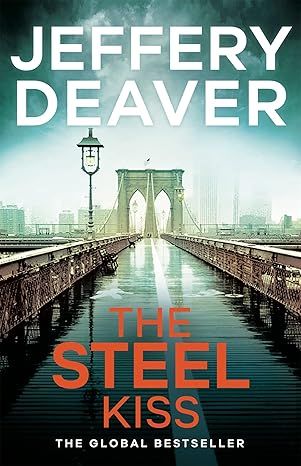
The Steel Kiss: Lincoln Rhyme Book 12 (Lincoln Rhyme Thrillers)
4.3
-
15,078
$2.55
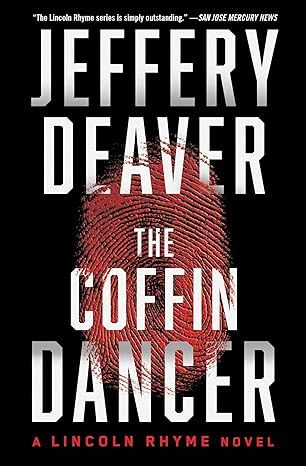
The Coffin Dancer: A Novel (2) (Lincoln Rhyme Novel)
4.5
-
5,617
$1.31
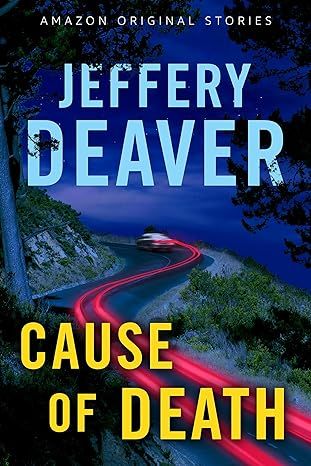
Cause of Death
4.2
-
5,166
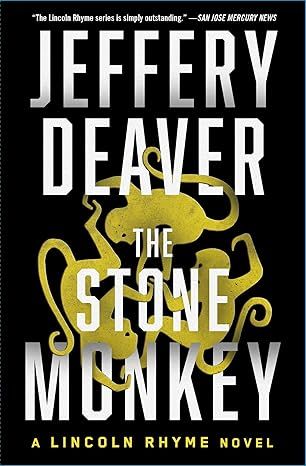
The Stone Monkey: A Lincoln Rhyme Novel (4)
4.5
-
4,802
$1.24
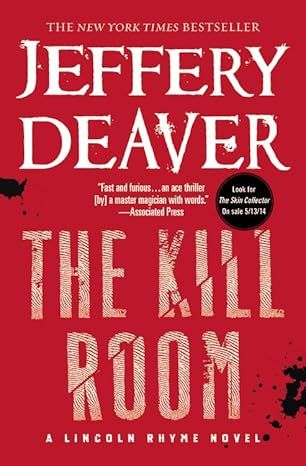
The Kill Room (Lincoln Rhyme)
4.3
-
6,193
$5.29
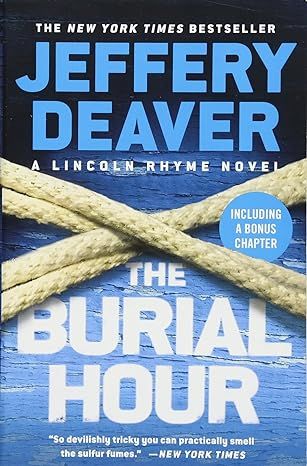
The Burial Hour (A Lincoln Rhyme Novel, 14)
4.2
-
12,268
$9.99
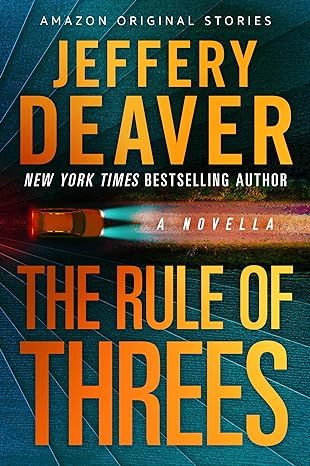
The Rule of Threes: A Novella
4
-
10,459
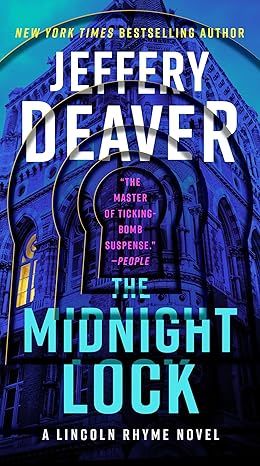
The Midnight Lock (Lincoln Rhyme Novel)
4.5
-
10,344
$2.05
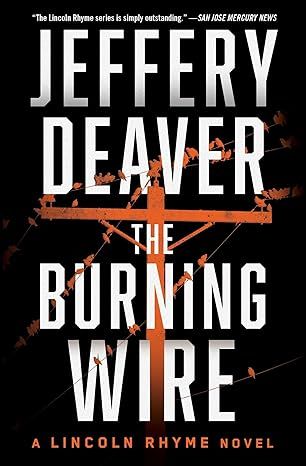
The Burning Wire (9) (Lincoln Rhyme Novel)
4.4
-
5,500
$3.99
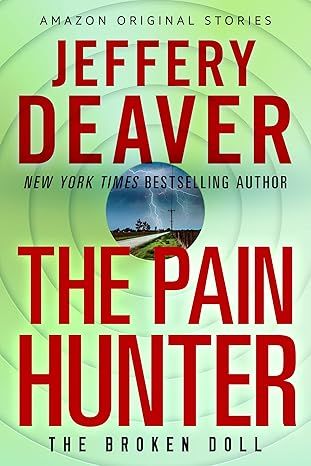
The Pain Hunter (The Broken Doll Book 1)
4.2
-
5,263
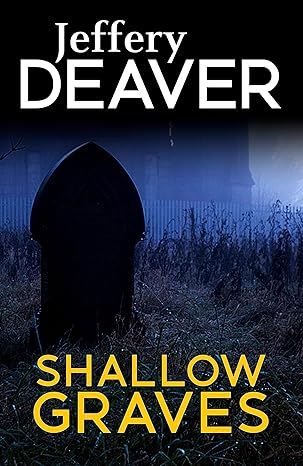
Shallow Graves
4
-
1,304
$3.82
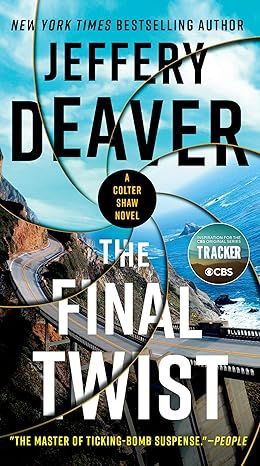
The Final Twist (A Colter Shaw Novel)
4.5
-
8,168
$1.97
Best Sellers

The Tuscan Child
4.2
-
100,022
$8.39

The Thursday Murder Club: A Novel (A Thursday Murder Club Mystery)
4.3
-
155,575
$6.33

Sapiens: A Brief History of Humankind
4.6
-
140,302
$13.49

The Butterfly Garden (The Collector, 1)
4.3
-
88,556
$9.59

Things We Hide from the Light (Knockemout Series, 2)
4.4
-
94,890
$11.66

The Last Thing He Told Me: A Novel
4.3
-
154,085
$2.99

The Perfect Marriage: A Completely Gripping Psychological Suspense
4.3
-
143,196
$9.47

The Coworker
4.1
-
80,003
$13.48

First Lie Wins: A Novel (Random House Large Print)
4.3
-
54,062
$14.99

Mile High (Windy City Series Book 1)
4.4
-
59,745
$16.19

Layla
4.2
-
107,613
$8.99

The Locked Door
4.4
-
94,673
$8.53
